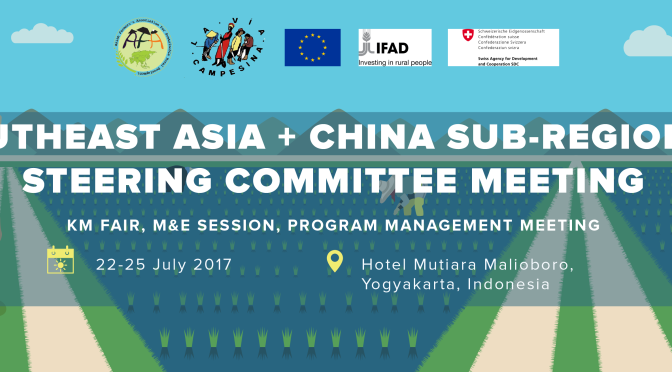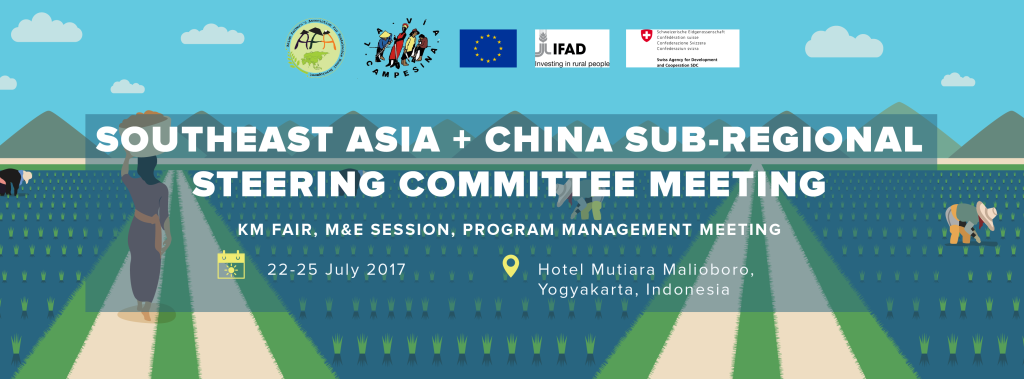Yogyakarta, Indonesia – Around 50 participants composed of farmer leaders, NIA secretariat staff, Knowledge Management (KM) officers, and Monitoring & Evaluation (M&E) officers from Cambodia, China, Indonesia, Laos, Myanmar, Vietnam, Philippines, and Thailand, representatives from ASEAN Foundation and AgriCord as well as the regional secretariat from the Asian Farmers’ Association for Sustainable Rural Development (AFA) and La Via Campesina (LVC) convened in Yogyakarta, Indonesia on 22-25 July 2017 for the MTCP2-AFOSP Southeast Asia + China Sub-Regional Steering Committee Meeting. The five-day meeting was divided into three parts: Knowledge Management Fair, Monitoring and Evaluation Session, and Program Management Meeting.
Knowledge Management Fair
The SRSC meeting opened with a two-day session on Knowledge Management. Each country presented stories about the projects they implemented which reflect the good practices they employed for the project to succeed. In the afternoon, a panel consisting of representatives from each member country also discussed briefly the most significant things they learned from all the cases presented.
The KM session provided an opportunity for the participants to share, learn and innovate from each other’s experiences, good practices, and success stories on production, governance, and advocacy. At the end of the day, the submitted stories were placed in a ‘market’ where the participants voted for their favorites by placing mock-up currencies under their bets.
To equip the participants with skills to better present their stories in the future, Irshad Khan of the International Fund for Agricultural Development (IFAD) shared guidelines on developing Knowledge Management materials focusing on producing good stories and photos. The KM and Communications team of the AFA also shared guidelines on communication and visibility, creating materials, and tips on the web, and social media posting of stories. The KM session aims to furnish the participants with skills in writing good stories, taking good photos, and other forms of documentation to help them effectively communicate the progress of their projects and their accomplishments to their target audience.
Field Visit
On the second day, the participants proceeded to Sleman District to visit a sustainable field laboratory in Dusun Ndero, Harjobinangun Village in Pakem subdistrict managed by Komunitas Pertanian Alami Sleman. In the laboratory, farmers cultivate organic vegetables including okra, mustard, pakcoy, etc. Afterward, the farmers demonstrated how to make calcium, nitrogen, potassium, and phosphate using natural ingredients including brown sugar, cow bones, eggshells, plants, etc. The different mixtures are fermented for several weeks, and when ready, are used as fertilizers in the farms. After the demonstration, each country shared its practices related to organic farming.
In the afternoon, the KM session resumed with a discussion by Mr. Khan on how to take good photos, which is just as important as the text when presenting stories about the projects. Each country was also asked to submit photos they took during the field visit which were shown to all and subjected for comments. Each country also wrote a story about the field visit applying the guidelines and tips they learned from the earlier discussions.
The KM Fair concluded with a solidarity night where the participants witnessed the diverse culture of Southeast Asia and China from the dance and song performances.
The winners of the Good Practices stories were also awarded. The Philippines won 3rd place with the story about how a “Coco Fiber Processing Facility” helped improve the lives of coconut farmers in a village in Camarines Norte, Philippines. Laos won 2nd place with the story about the youth getting into agriculture by selling organic vegetables and fruits through “Farmer Basket”. Myanmar bagged 1st place with the story about Saw Htoo Baw, a young farmer who aims to reintroduce the traditional and natural ways of farming for sustainable agriculture to uplift the living conditions of farmers. Laos also received a special award for submitting the most number of entries.
Monitoring and Evaluation Session
On the 3rd day, the Management Information System (MIS), the new web-based system for planning and management of projects, was unveiled. The new system aims to make monitoring and assessment of project’s progress and performance, and reporting of updates easier and faster. The Monitoring and Evaluation officers were trained by the system developers on how to utilize the tool. However, proposed modifications and other suggestions from the M&E officers will be made in the system to make it more efficient.
Program Meeting
The last day of the meeting was allotted for updating and reporting key activities for the first semester of 2017. The targets and outputs of the programs and the upcoming activities were discussed as well.
The SRSC SEA Sub-Regional Steering Committee Meeting is organized by the consortium Asian Farmers’ Association for Sustainable Rural Development (AFA) and La Via Campesina (LVC), in partnership with the ASEAN Foundation, and is supported by the European Union (EU), International Fund for Agricultural Development (IFAD), and Swiss Agency for Development and Cooperation (SDC).
KM FAIR
- Philippines: Coco-Fiber Processing Facility generates alternative livelihood for coconut farmers
- Laos: Farmer basket–an alternative marketing approach for young organic vegetable farmers
- Laos: “Beautiful Wife” rice cultivation technique significantly reduces labor
- Laos: Directory of Farmer Experts
- Vietnam: Ha Tinh Farmers’ Union & IFAD cooperation results to sustainable economy, harmony in the community
- Myanmar: Saw Htoo Baw: A small farmer with big dreams
- Cambodia: Sdok Sdom Agricultural Cooperative Marketing Linkage
- Cambodia: The local capital mobilization through creating of saving and credit group (SahakhumKasekamSensokToekThla)
- Indonesia: In Promoting Agricultural Cooperative of Coffee
- China: MTCP2 supports Farmers’ Cooperatives Innovation and Development Forum in Beijing
- China: AMI promotes Ningbo (China) Cooperative Development
- China: Development of Gansu Federation of Farmers Cooperatives
- China: Call on Resultant Force for New Policy Landing
About AFOSP-MTCP2
AFOSP-MTCP2 is a capacity-building program funded by the European Union (EU) with co-financing from the International Fund for Agricultural Development (IFAD) and the Swiss Agency for Development and Cooperation (SDC). The program is being implemented in seven ASEAN countries through the consortium Asian Farmers’ Association for Sustainable Rural Development (AFA) and La Via Campesina (LVC). AFOSP-MTCP2 supports the strengthening of national farmers’ organizations (FOs) and their national platform towards improving their institutional capacity to deliver economic services to their members as well as to effectively engage them in policy processes. At the ASEAN level, the consortium AFA – LVC works in partnership with the ASEAN Foundation in expanding the spaces for the engagement of FOs in ASEAN processes.





Comments are closed